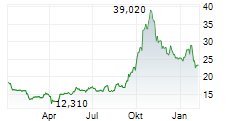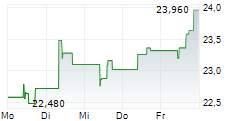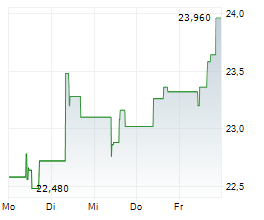There were no suspected or confirmed PDSS (Post-injection Delirium/Sedation Syndrome)1 events observed with Medincell's Olanzapine LAI through week 56 in the pivotal Phase 3 SOLARIS trial2
The long-term systemic safety profile was consistent with other olanzapine formulations2
Teva plans to proceed with an NDA submission of Olanzapine LAI in the US in Q4 2025
The new data were showcased in one of ten schizophrenia-related posters presented by Medincell's partner, Teva, at the 2025 Psych Congress, held from September 17 to 21 in San Diego, California
Regulatory News:
Medincell (Paris:MEDCL):
Olanzapine LAI (mdc-TJK TEV-'749) is an investigational, once-monthly, subcutaneous long-acting injection of the atypical antipsychotic olanzapine for the treatment of schizophrenia. This is the second product within the Teva partnership after UZEDY approved by the FDA in April 2023 that uses Medincell's co-polymer technology (licensed to Teva under the name SteadyTeq) to generate a controlled steady release of drug throughout the dosing interval. Teva is currently preparing for regulatory submission and launch of Olanzapine LAI with NDA submission anticipated in Q4 2025.
Richard Malamut, Chief Medical Officer of Medincell said: "The final Phase 3 data confirm that no cases of PDSS occurred during the study. They also validate the long-term safety profile of our Olanzapine LAI which is consistent with existing olanzapine formulations. This pivotal milestone strengthens the therapeutic value of Olanzapine LAI and enables its progression toward regulatory submission. We are now one step closer to delivering a long-acting treatment option that could significantly improve outcomes for patients living with schizophrenia."
Medincell's partner Teva leads the clinical development and regulatory process and is responsible for commercialization of the Olanzapine LAI. Medincell is entitled to receive royalties on net sales, along with development and commercial milestone payments.
1 Post-Injection Delirium/Sedation Syndrome (PDSS) is a rare but significant complication associated with existing long-acting injectable formulation of olanzapine. PDSS occurs when a portion of the injected medication unintentionally enters the bloodstream too quickly, causing sudden sedation, confusion, and potentially serious side effects such as respiratory issues. For healthcare providers and patients, PDSS remains a barrier to the widespread use of olanzapine LAI. The requirement for close post-injection monitoring limits the convenience and flexibility of this treatment option. Medincell's olanzapine LAI is designed to eliminate the risk of PDSS, potentially making it a safer and more accessible treatment option.
2 Data on file. Parsippany, NJ: Teva Neuroscience, Inc.
Olanzapine LAI (mdc-TJK TEV-'749) is not approved by any regulatory authority for any use, and its safety and efficacy are not established.
Extract from Teva's press release September 20, 2025 "The first formulation of olanzapine was approved nearly 30 years ago and is now one of the most commonly prescribed daily oral medicines for the treatment of schizophrenia. With these long-term safety results from SOLARIS, olanzapine LAI (TEV-'749) has the potential to address a critical treatment gap by introducing a new era of long-acting olanzapine treatment," said Eric Hughes, MD, PhD, Executive Vice President, Global R&D and Chief Medical Officer at Teva. "These encouraging results from the SOLARIS trial show that olanzapine LAI (TEV-'749) has the potential to be the first long-acting olanzapine treatment option that alleviates the risk of PDSS. As a clinician, this is a critical development for people living with schizophrenia who may not prefer, or have difficulties adhering to daily oral treatment options," said Christoph Correll, MD, Professor of Psychiatry at the Zucker School of Medicine, Hempstead, NY and SOLARIS study coordinating investigator. "Olanzapine is a long-established treatment option for schizophrenia with a well-known safety and efficacy profile, and olanzapine LAI (TEV-'749) is building on that legacy with an innovative long-acting formulation that may help fill a significant gap in the current treatment landscape." Teva's Phase 3 SOLARIS trial program (NCT05693935) comprised an 8-week, randomized, double-blind, placebo-controlled period (Period 1 [P1]) in 18-64-year-old participants (n=675) with schizophrenia, followed by an open-label, long-term safety period =48 weeks (P2). For P1, participants were randomized 1:1:1:1 to once-monthly olanzapine LAI (TEV-'749) (318mg, n=169; 425mg, n=169; 531mg, n=169) or placebo (n=168).1 For P2, P1 olanzapine LAI (TEV-'749) participants retained their treatment; P1 placebo participants were re-randomized to olanzapine LAI (TEV-'749) dose-groups.1 Through Week 56, an integrated long-term safety analysis from the double-blind and open-label periods demonstrated a systemic safety profile for olanzapine LAI (TEV-'749) that was consistent with second-generation antipsychotic class effects and other olanzapine formulations. Consistent with previous results, no PDSS events (suspected or confirmed) were reported (3,470 total injections).1 Olanzapine LAI (TEV-'749) utilizes SteadyTeq, a copolymer technology proprietary to Medincell that provides a controlled steady release of olanzapine. Across olanzapine LAI (TEV-'749) groups, one or more treatment-emergent adverse events (TEAE) were reported in 449 (74%) participants with 50 (8%) experiencing TEAEs leading to trial discontinuation. Serious AEs were reported in 36 (6%) participants.1 Most commonly reported TEAEs were weight increased (36%); injection site reactions (ISRs; induration [12%], pain [12%], erythema [10%], pruritus [7%]); and somnolence (7%).1 Additionally, long-term effectiveness data from SOLARIS demonstrated long-term symptom improvement and maintained clinical effectiveness in adults participants taking olanzapine LAI (TEV-'749).1 Across all olanzapine LAI (TEV-'749) doses, stable change from P2 baseline in Positive and Negative Syndrome Scale (PANSS) total and Clinical Global Impression-Severity (CGI-S) scale scores (mean change from baseline: -7.2 and -0.5, respectively) were observed. Olanzapine LAI (TEV-'749) also improved patient functioning scores, with a 4.6-point mean increase in Personal and Social Performance Scale (PSP) score from P2 baseline.1 A weight and metabolic analysis of the SOLARIS trial found that long-term metabolic safety data for olanzapine LAI (TEV-'749) were consistent with currently available olanzapine formulations.1 The overall mean weight increase from baseline in participants who received olanzapine LAI (TEV-'749) for =48 weeks (n=137) was 5.6kg, which was comparable to those reported for oral and intramuscular olanzapine formulations. By week 32, all olanzapine LAI (TEV-'749) and placebo groups reached a similar mean weight increase versus baseline, which thereafter remained stable through week 48.1 Read the full Teva's press release: https://ir.tevapharm.com/news-and-events/press-releases/press-release-details/2025/New-Long-term-Safety-Data-from-the-Completed-Phase-3-SOLARIS-Trial-Support-the-Potential-of-Olanzapine-LAI-TEV-749-as-the-First-Long-Acting-Olanzapine-Treatment-Option-for-Schizophrenia-with-No-PDSS-Observed/default.aspx 1 Data on file. Parsippany, NJ: Teva Neuroscience, Inc. |
Schizophrenia data presented by Teva at the 2025 Psych Congress
TEV-'749 (olanzapine LAI)
- (De novo) Long-Term Safety of Subcutaneous Long-Acting Injectable Olanzapine (TV-44749) in Schizophrenia: Results From the Phase 3 SOLARIS Trial
- (De novo) Long-Term Effectiveness With Subcutaneous Long-Acting Injectable Olanzapine (TV-44749) in Adults With Schizophrenia: Results From Up to 48 Weeks Open Label Treatment in the Phase 3 SOLARIS Trial
- (De novo) Evaluating Long-Term Weight Gain and Other Metabolic Changes With Subcutaneous Long-Acting Injectable Olanzapine (TV-44749) in Adults With Schizophrenia: Results From the Phase 3 SOLARIS Trial
- (De novo) Real-World Evidence of the Burden of Non-Adherence to Oral Olanzapine on Relapse and Healthcare Resource Utilization Among Adults With Schizophrenia
- (De novo) Clinician Perspectives on Olanzapine-Associated Adverse Event Mitigation Strategies for Schizophrenia Treatment: Results From the SONAR (Survey on Olanzapine Needs and Attitudes Research) Study
- (De novo) Clinician Perspectives on Long-Acting Injectable Olanzapine Treatment Barriers and Unmet Needs From the SONAR (Survey on Olanzapine Needs and Attitudes Research) Study
UZEDY (risperidone)
- (De novo) Outcomes and Healthcare Professional Preferences for Initiating TV-46000, a Long-Acting Subcutaneous Antipsychotic, or Intramuscular Paliperidone Palmitate in Patients Hospitalized With Schizophrenia
- (De novo) Switching Patients With Schizophrenia to TV-46000, a Long-Acting Subcutaneous Antipsychotic, From Aripiprazole Once Monthly: Pharmacokinetic-Pharmacodynamic Modeling and Simulation
- (De novo) Real-World Experiences Using TV-46000 in Adults With Schizophrenia: A Qualitative Study of Healthcare Professionals
- (De novo) Time-Varying Predictors of Relapse in Patients Treated With TV-46000 or Placebo in the RISE Study: A Machine-Learning Analysis
About Medincell
Medincell is a clinical- and commercial-stage biopharmaceutical licensing company developing long-acting injectable treatments across multiple therapeutic areas. Our innovative treatments are designed to ensure adherence to medical prescriptions, enhance the effectiveness and accessibility of medicines, and reduce their environmental impact.
These treatments combine active pharmaceutical ingredients with our proprietary BEPO technology, which enables controlled drug delivery at therapeutic levels for several days, weeks, or months following a subcutaneous or local injection of a small, fully bioresorbable deposit.
The first treatment based on BEPO technology was approved for schizophrenia by the FDA in April 2023 and is now marketed in the United States by Teva under the name UZEDY (BEPO technology is licensed to Teva under the name SteadyTeq).
Our investigational pipeline includes numerous innovative therapeutic candidates in various stages of development, from formulation to Phase 3 clinical trials. We collaborate with leading pharmaceutical companies and foundations to advance global health through new treatment options.
Headquartered in Montpellier, France, Medincell employs over 140 people representing more than 25 nationalities.
medincell.com
UZEDY and SteadyTeq are trademarks of Teva Pharmaceuticals.
This press release may contain forward-looking statements, particularly concerning the progress of the Company's clinical trials. Although the Company considers that its forecasts are based on reasonable assumptions, any statements other than statements of historical fact that may be contained in this press release relating to future events are subject to change without notice, to factors beyond the Company's control and to the Company's financial capabilities.
These statements may include, but are not limited to, any statements beginning with, followed by or including words or expressions such as "objective", "believe", "expect", "aim", "intend", "may", "anticipate", "estimate", "plan", "project", "will", "may", "probably", "should", "could" and other words or expressions of similar meaning or used in the negative. Forward-looking statements are subject to inherent risks and uncertainties beyond the Company's control which may cause actual results, performance or achievements of the Company to differ materially from those anticipated or implied by such statements.
A list and description of such risks, hazards and uncertainties can be found in the documents filed by the Company with the Autorité des Marchés Financiers (AMF) pursuant to its regulatory obligations, including in the Company's document de base, registered with the AMF on September 4, 2018 under number I. 18-062, as well as in documents and reports to be published subsequently by the Company. Furthermore, these forward-looking statements only apply as of the date of this press release. Readers are cautioned not to place undue reliance on these forward-looking statements. Except as required by law, the Company undertakes no obligation to publicly update these forward-looking statements, nor to update the reasons why actual results may differ materially from those anticipated in the forward-looking statements, even if new information becomes available. The Company's updating of one or more forward-looking statements does not imply that it will or will not update these or any other forward-looking statements.
This press release is published for information purposes only. The information contained herein does not constitute an offer to sell or a solicitation of an offer to buy or subscribe for securities of the Company in any jurisdiction whatsoever, particularly in France. Similarly, this press release does not constitute investment advice and should not be treated as such. It is not intended to address the investment objectives, financial situation or specific needs of any particular recipient. It should not be relied upon as a substitute for the exercise of your own judgement. All opinions expressed in this document are subject to change without notice. The distribution of this press release may be restricted by law in certain jurisdictions. Persons into whose possession this press release comes are required to inform themselves about and to observe any such restrictions.
View source version on businesswire.com: https://www.businesswire.com/news/home/20250921531172/en/
Contacts:
David Heuzé
Head of Corporate and Financial Communications, and ESG
david.heuze@Medincell.com +33 (0)6 83 25 21 86
Grace Kim
Chief Strategy Officer, U.S. Finance
grace.kim@medincell.com +1 (646) 991-4023
Nicolas Mérigeau Arthur Rouillé
Media Relations
Medincell@newcap.eu +33 (0)1 44 71 94 94
Louis-Victor Delouvrier Alban Dufumier
Investor Relations France
Medincell@newcap.eu +33 (0)1 44 71 94 94




